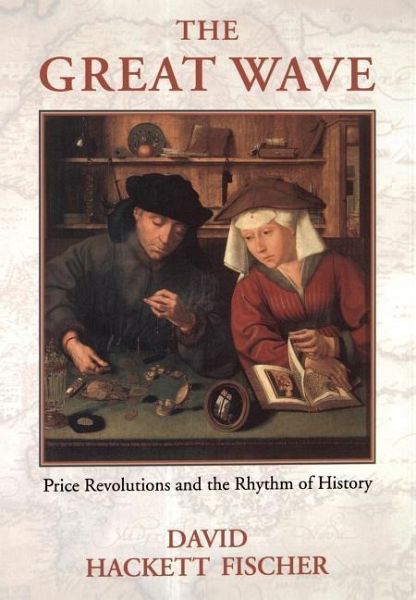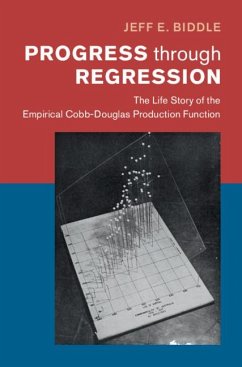
The Great Wave
Price Revolutions and the Rhythym of History

PAYBACK Punkte
49 °P sammeln!
Records of prices are more abundant than any other quantifiable data, and span the entire range of history, from tables of medieval grain prices to the overabundance of modern statistics. Fischer studies this wealth of data, creating a narrative that encompasses all of Western culture. He describes four waves of price revolutions, each beginning in a period of equilibrium: the High Middle Ages, the Renaissance, the Enlightenment, and finally the Victorian Age. Each revolution is marked by continuing inflation, a widening gap between rich and poor, increasing instability, and finally a crisis at the crest of the wave that is characterized by demographic contraction, social and political upheaval, and economic collapse. The most violent of these climaxes was the catastrophic fourteenth century, in which war, famine, and the Black Death devastated the continent - the only time in Europe's history that the population actually declined. Fischer also brilliantly illuminates how these long economic waves are closely intertwined with social and political events, affecting the very mindset of the people caught in them. The long periods of equilibrium are marked by cultural and intellectual
"The history of prices is the history of change", writes David Hackett Fischer in this broad sweep of western history from the middle ages to our own time. His primary sources are price records, which are more abundant for the study of historical change than any other type of quantifiable data. Fischer uses these materials to frame a narrative of price-movements in western history from the eleventh century to the present. He finds that prices tended to rise throughout this long period, but most of their increase happened in four great waves of inflation - which he calls the price-revolutions of the thirteenth, sixteenth, eighteenth, and twentieth centuries. The four waves shared many qualities in common. All had the same movements of prices and price-relatives, falling real wages, rising returns to capital, and growing gaps between rich and poor. They were also very similar in the structure of change. Each of them started silently, developed increasing instability, and ended in a shattering crisis that combined social disorder, political upheaval, economic collapse, and demographic contraction. These crises happened in the fourteenth, seventeenth, and late eighteenth centuries. They were followed by long periods of comparative equilibrium: the Renaissance, the Enlightenment, and the Victorian era. In all of these eras prices fell and stabilized, wages rose, and inequalities diminished. Then another great wave began and the pattern repeated itself, but not in precisely the same way. Fischer quotes Mark Twain: history doesn't repeat itself, but it rhymes. Through all of these movements, Fischer explores the linkages between economic trends, social tendencies, political events, andcultural processes. He finds that long periods of price-equilibrium were marked by a faith in order, harmony, progress, and reason. By contrast, price-revolutions created cultures of despair in their middle and later stages. Fischer examines the cause of these movements, and discusses the models that have been used to explain them. He also considers their consequences. Fischer does not attempt to predict what will happen next, noting that "uncertainty about the future is an inexorable fact of our condition". Rather, he ends with an analysis of where we might go from here, and what our choices are now. This book should be required reading for anyone who is seriously concerned about the state of the world today.













